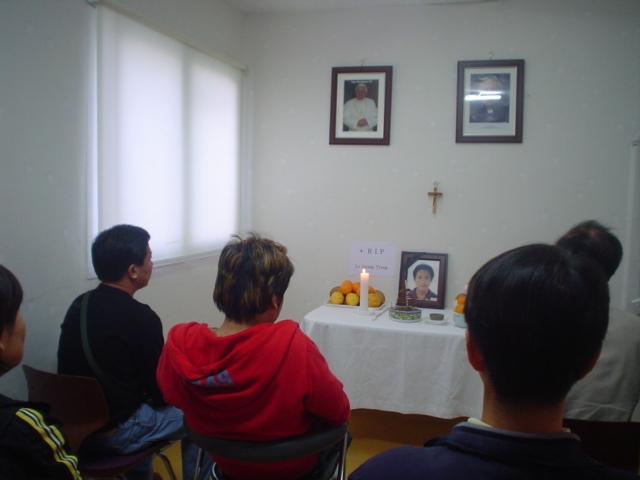Fr Andrew Lee Sung-gyoon SJ, the new director of Yiutsari, the Jesuit migrant centre in Korea, reflects on the death of a young Thai migrant worker in Korea and what it says about Korean society.
On February 8, sad news of the death of a young Thai worker came to me. I rushed to the hospital to meet his relatives and friends. According to them, this young man had been too weak to work and had gone to a small local hospital. Several days ago before his death, he decided to go to the general hospital and was hospitalised but he died one day later.

His mother and young wife came to Korea for his funeral. With Brother Oh, I accompanied them to help with their needs. When I learned how young he was when he left his family, great sorrow filled my heart. When we were in the hospital to see his body, only a handful of people were there. It was hard to find any human dignity only the loneliness and sorrow of his relatives. It was a migrant worker’s funeral in Korea! No dignity. It was even painful for us to be there.
The doctors said he died of “heart failure”. According to them, he had suffered from inflammation in the heart caused by infection. They added that if he had come to the hospital earlier, they could have saved his life. He was also HIV-positive. Heart failure, inflammation, infection and HIV… all these things collaborated to kill him but the real story is behind these medical terms.
The truth is that one young and healthy Thai lived with his wife and mother in his home country. After 14 months in Korea, he was dead in a hospital. What actually killed him? He had worked in the factory for more than 12 hours every day. The labour law stipulates that workers are typically expected to work for eight hours a day. Of course, workers have the option to work over-time and earn higher salaries. The problem is that workers, especially foreign ones, in the factory are under great pressure. The priority of the factory is clearly profit, not the workers’ right to choose their working time. Workers who follow the standard working time are regarded as persona non grata. They soon realise that they are considered selfish and that they will be dismissed.
Another hidden reality in the death of the Thai worker is the fact that now we can find many Thai massage parlours in Korea. Several years ago, Thai massage parlours were a symbol of a Korean’s desire for a healthy life. Now, their presence has become a symbol of the emergent sex industry for migrants in Korea. The doctors and police suspected that he had contracted HIV in one of these parlours. His companions supported this suspicion, saying that he liked to go to these places to cope with his loneliness. His HIV status and the presence of the sex industry for migrants show the bitter reality of life for migrants in Korea.
Again, who or what killed him? Infection, inflammation, malfunction of his heart, and the hard life as a migrant worker, his loneliness, all these combined to kill him. But there is another culprit – the inability of Korean society to answer to the needs and desires of fellow men and women who are called migrants. Yiutsari was established to help amend this brokenness. When I worked in Yiutsari during my Regency, the most urgent mission was to serve and accompany migrants through consultation on labour issues and legal advice. Now we are facing a new reality. Korean society should embrace migrant workers as fellow human beings. We should respect their desire for a life with dignity.

